Una sorpresa dalla storia antica: la Magna Grecia... eravamo noi
🇬🇧 Amazing news from ancient history: the Magna Graecia was Southern Italy
🇮🇹 Ciao! Oggi niente conversazione ma una passeggiata vitaminica al Museo Archeologico di Reggio Calabria. Se sei nuova/o, io sono Patrizia e sono al lavoro su
🇬🇧 Hi! No conversation today but a vitamin walk from the Archaeological Museum of Reggio Calabria. If you are new, I am Patrizia and I am at work on
🇮🇹 Un po’ di preistoria
In Calabria sono state ritrovate tracce di insediamenti di faune scese da Nord durante l’ultima glaciazione, e dei Neandertal, gli ominidi antecedenti ai Sapiens, cioè noi. Di aspetto erano più tarchiati, con arti inferiori corti e corpo più massiccio. Oltre a cacciare, si dedicavano a realizzare utensili. Vivevano in villaggi, dove le case rappresentavano il luogo ordinato e organizzato in contrapposizione al selvatico. La casa e la donna erano figure cariche di simboli. Perché si estinsero ancora non si è capito. E soprattutto non si è capito perché non abbiano mai attraversato lo Stretto. Forse non sapevano navigare? O forse c’è qualcosa che noi dobbiamo ancora trovare?
🇬🇧 Prehistorical intro
In Calabria, traces have been found of settlements of animals that came down from the north during the last ice age, and of Neandertals, the hominids that came before us Sapiens. In appearance they were more stocky, with short lower limbs and a more massive body. In addition to hunting, they devoted themselves to making tools. They lived in villages, where houses represented the ordered and organised place as opposed to the wild. The house and the woman were figures laden with symbols. Why they became extinct is still not understood. And above all, it is not understood why they never crossed the Messina Strait. Perhaps they did not know how to sail? Or perhaps there is something we have yet to find?
🇮🇹 Da un re enotrio di nome Italo, Calabria e Basilicata avrebbero preso il nome Italìa 🤓
termine che venne poi esteso a indicare i popoli avversari di Roma. Erano tempi di traffici intensi nel Mediterraneo. I Fenici delle fiorenti città-stato di Libia e Siria permisero coi loro commerci la diffusione di oggetti e pratiche orientali. Poi arrivarono i Greci dell’Eubea, la grande isola a nord dell’Attica, alla ricerca di metalli rari. Alcuni di questi scelsero Pithekoussai (Ischia) come base commerciale dei loro traffici verso i bacini minerari di Sardegna ed Etruria. Giunta la notizia dell’esistenza di fertili pianure lungo le nostre coste in Grecia, in tanti si convinsero a trasferirsi oltremare, sulla scia tanto dei crescenti squilibri sociali in madrepatria come anche di mire espansionistiche. Sorsero così numerose comunità, organizzate secondo il modello ellenico della polis (città-stato indipendente), spesso l’una in competizione con l’altra.
🇬🇧 Calabria and Basilicata would take the name Italìa 🤓 from a local Oenotrian king named Italo
a term that was later extended to indicate all peoples opposing Rome. Those were times of intense trade in the Mediterranean. The Phoenicians from the flourishing city-states of Libya and Syria enabled the spread of oriental objects and practices with their trade. Then came the Greeks from Euboea, the large island north of Attica, in search of rare metals. Some of these chose Pithekoussai (Ischia) as the commercial base of their trade towards the mining basins of Sardinia and Etruria. When the news of the existence of fertile plains along Italian coasts arrived in Greece, many were convinced to move overseas, in the wake of both the growing social imbalances in the motherland and expansionist aims. Thus numerous communities sprang up, organised according to the Hellenic model of the polis (independent city-state), often competing with each other.
🇮🇹 Intorno al 730 a.C. gli Eubei fondano Reghion (Reggio Calabria) 🌊
Fecero un sacrificio ad Apollo nel corso di una carestia, e il dio rispose di fondare una città in un luogo preciso. Così partirono. E arrivati alla destra del fiume Apsias (probabilmente la fiumara Calopinace a sud di Reggio) vi trovarono una vite avvinghiata a un fico selvatico, interpretando quello come il luogo designato.
Dove il fiume Apsias, il più sacro dei fiumi, si getta in mare, troverai una donna che si unisce a un uomo. Lì fonderai la tua città, perché il dio ti concede la terra Ausonia. - Diodoro Siculo (VIII, fr. 23.2)
Vennero poi dall’Acaia, e dalla Locride (nella Grecia continentale). I coloni scelsero territori fertili occupati da comunità ben organizzate ma non unite e quindi non in grado di opporre una valida resistenza. Fu la fine di un’epoca: molti villaggi e usanze enotri millenari furono abbandonati. Gli Eubei fondarono quasi in contemporanea anche Zankle (Messina), con lo scopo di attuare una politica di dominio sullo Stretto. La disponibilità di terreni fertili facilitò la crescita della popolazione e della prosperità della Magna Grecia (Grecia “la Grande” d’Occidente), che sviluppò forme d’arte, architetture e monumenti indipendenti dalla 🇬🇷 Grecia madrepatria. In Campania, Kyme (Cuma) e le altre póleis trasmisero l’alfabeto e i miti greci a Etruschi e Latini dell’Italia centrale.
🇬🇧 Around 730 BC, the Euboians founded Reghion (Reggio Calabria) 🌊
They made a sacrifice to Apollo during a famine, and the god replied to found a city in a specific place. So they set off. And when they arrived at the right bank of the river Apsias (probably the Calopinace River, at the South of Reggio), they found a vine clinging to a wild fig tree, interpreting that as the designated place.
Where the river Apsias, the holiest of rivers, empties into the sea, you will find a woman joined to a man. There you will found your city, for the god grants you the land Ausonia. - Diodorus Siculus (VIII, fr. 23.2)
Then more came from Achaia, and from Locris (in mainland Greece). They chose fertile territories occupied by communities that were well organised but not united and therefore unable to put up a viable resistance. It was the end of an era: many millenary villages and Oenotrian customs were abandoned. The Euboeans also founded Zankle (Messina) almost simultaneously, with the aim of implementing a policy of domination over the Strait. The availability of fertile land facilitated the growth of the population and prosperity of Magna Graecia (the Great Greece of the West), which developed forms of art, architecture and monuments independent of the native 🇬🇷 Greece. In Campania, Kyme (Cumae) and other póleis transmitted the Greek alphabet and myths to the Etruscans and Latins of central Italy.
🇮🇹 Al posto dei villaggi sorgono le póleis (città) espressione di una struttura sociale completamente nuova 😯
L’urbanistica in Europa cominciò proprio fra i Greci dell’Italia meridionale. Le città presentavano un reticolo di strade ortogonali che definiva isolati identici, scanditi in lotti uguali. Il fulcro delle case era il cortile, c’era un porticato e vari ambienti. Esisteva anche un quartiere artigianale, il Ceramico, per manufatti d’argilla e di terracotta, che allora erano ampiamente usati. E c’era il santuario, spazio sacro delimitato in cui sorgeva il tempio, ovvero la “casa del dio”, che ne custodiva la statua. Per i Greci antichi, sacro era qualsiasi luogo dove percepivano la presenza divina e dove la stessa si potesse incontrare. La monumentalità del tempio era sia espressione di devozione come anche di propaganda da parte della città, che mostrava così la propria identità e potenza politico-economica.
🇬🇧 No more villages, but póleis (cities): the expression of a completely new social structure 😯
Urban planning in Europe began among the Greeks of Southern Italy. The cities had a network of orthogonal streets that defined identical blocks of flats. The focus of the houses was the courtyard, there was a portico and various rooms. There was also a craft district, the Ceramico, for clay and terracotta artefacts, which were widely used at the time. And there was the sanctuary, a delimited sacred space in which stood the temple, or 'house of the god', which guarded the statue. For the ancient Greeks, sacred was any place where they perceived the divine presence and where it could be encountered. The monumentality of the temple was both an expression of devotion as well as propaganda on the part of the city, to display its identity and power.
🇮🇹 Uomo e dio: un rapporto di scambio più che vera fede 🤔
Io ti faccio l’offerta, tu però mi fai la grazia... come a Persefone, figlia di Demetra, dea che presiedeva all’agricoltura, e sposa di Hades, signore dell’oltretomba, che era dunque vista come divinità a cui rivolgersi per assicurarsi tanto la fecondità della natura, come la garanzia di un destino benevolo dopo la morte. I Greci non si fidavano a pregare soltanto: l’offerta al dio era il mezzo per garantire l’esaudimento della richiesta. Si facevano sacrifici di animali, in parte cremati e in parte mangiati, ma tante volte anche sacrifici incruenti di vegetali, frutti, corone di fiori, e liquidi come acqua, vino o latte. Durante le feste religiose sacrifici e offerte erano preceduti dalla processione e seguiti da manifestazioni sportive, musicali e teatrali.
🇬🇧 Man and god: an exchange-based relationship more than true faith 🤔
I give you the offering, but you grant me the grace... as with Persephone - daughter of Demeter, the goddess who presided over agriculture, and wife of Hades, lord of the underworld - who was therefore seen as a divinity to whom one could turn to ensure both the fertility of nature and the guarantee of a benevolent destiny after death. Because the Greeks did not trust prayers alone, the offering to the god was the means to guarantee the fulfilment of the request. Sacrifices of animals were made, partly cremated and partly eaten, but many times also bloodless sacrifices of vegetables, fruit, wreaths of flowers, and liquids such as water, wine or milk. During religious festivals, sacrifices and offerings were preceded by a procession and followed by sporting, musical and theatrical events.
🇮🇹 Gli spettacoli teatrali NON erano intrattenimento 🤨
anzi se ne considerava la partecipazione un obbligo civico! Ad Atene si facevano gare fra drammaturghi e commediografi tali da far vivere un’esperienza totalizzante con 2 scopi: la kátharsis (purificazione) delle emozioni e l’educazione ai valori della società civile. I canti corali in onore del dio Dioniso, sono considerati predecessori della tragedia greca. Molto apprezzate erano anche le commedie, che facevano ampio uso di mimi, danzatori e acrobati. I “nostri” Greci conoscevano i poemi omerici, e affidarono all’epica il ricordo degli episodi storici che li avevano coinvolti, (la battaglia di… il pugile vincitore delle Olimpiadi… il mito della dea…) condendoli di leggenda a fini di propaganda; storie eroiche che prima di venir elaborate in forma ufficiale, furono probabilmente oggetto di racconti locali accompagnati da canti e musica.
🇬🇧 Theatre performances were NOT entertainment 🤨
on the contrary, participation was considered a civic obligation! In Athens, competitions were held between playwrights and comedy writers to provide an all-encompassing experience with two purposes: kátharsis (purification) of the emotions and education in the values of civil society. The choral songs in honour of the god Dionysus are considered predecessors of the Greek tragedy. Comedies, which made extensive use of mimes, dancers and acrobats, were also popular. “Italian” Greeks were familiar with the Homeric poems, and entrusted epics with the memory of historical episodes that had involved them (the battle of... the boxer who won the Olympics... the myth of the goddess...), seasoning them with legend for propaganda purposes; heroic stories that, before being elaborated in official form, were probably the subject of local tales accompanied by songs and music.
🇮🇹 E il rapporto con la morte? Da paura 😬
Perché i defunti accettassero il loro destino e non si mostrassero ostili coi vivi, i Greci accompagnavano le spoglie con un corredo di oggetti, come a voler garantire al defunto di “continuare” la stessa vita nell’aldilà. Per la paura di ritrovarsi in un luogo desolato di anime vaganti, tanti ricorrevano a pratiche esoteriche svolte in assoluta segretezza (come la religione misterica ispirata ad Orfeo) sperando di assicurarsi così l’immortalità dell’anima in un luogo beato. In alcune tombe sono state ritrovate persino delle lamine d’oro recanti “istruzioni” (ad esempio, di non bere ad una certa fonte ma a un’altra, e di recitare una particolare formula). La morte coinvolgeva l’intera comunità, perché bisognava ristabilire l’ordine delle cose. Le salme venivano lavate e cosparse di oli profumati. Le donne si abbandonavano a lamenti con gesti forti, come strapparsi i capelli. Il terzo giorno funerale alla necropoli, seguito da offerte di cibi e bevande. Infine un pasto in comune rinsaldava il gruppo nel segno di un ritorno alla normalità.
🇬🇧 How did they see death? Frightening 😬
In order for the deceased to accept their fate and not manifest themselves hostile with the living, the Greeks accompanied the remains with many objects, as if to guarantee the soul would “continue” the same life after death. Out of fear of finding themselves in a desolate place of wandering souls, many resorted to esoteric practices carried out in absolute secrecy (such as the mystery religion inspired by Orpheus) hoping thus to ensure the immortality of the soul in a blissful place. In some tombs, gold plates have been found bearing “instructions” (e.g. not to drink from a certain spring but another, and to recite a particular formula). Death involved the whole community, because the order of things had to be restored. The corpses were washed and sprinkled with perfumed oils. Women used to mourn with strong gestures, such as pulling out their hair. On the third day, funerals were held at the necropolis, followed by offerings of food and drinks. Finally, a communal meal strengthened the group as a sign of return to normality.
🇮🇹 V secolo a.C.: risorge il mondo italico 🤓
Non tutte le comunità indigene erano però scomparse all’arrivo dei Greci; alcune della Basilicata interna erano legate a loro solo da rapporti commerciali. Questa situazione pose le basi per una rinascita. Vennero così Lucani e Brettii, i primi capostipiti dei secondi. Era infatti in vigore il rituale ver sacrum (primavera sacra), secondo il quale un’intera generazione veniva allontanata dalla tribù d’origine e inviata a conquistare nuovi territori. Tale migrazione avveniva seguendo un animale sacro, che nel caso dei Lucani era il lupo. Lucani e Brettii (Bruttii per i Romani) conquistarono molte póleis. Ma il sistema insediativo di queste popolazioni fu messo in crisi dall’alleanza con Annibale, il famoso generale cartaginese che aveva sfidato apertamente Roma. Sconfitto lui, anche i due popoli si arrenderanno alla futura capitale del nuovo impero.
🇬🇧 5th century BC: the Italic peoples return 🤓
Not all indigenous communities had disappeared when the Greeks arrived; some living in inland Basilicata were only linked to them by trade relations. This situation laid the foundations for a revival. Thus came Lucanians and Brettii, the former being the progenitors of the latter. In fact, the ver sacrum (sacred spring) ritual was in force, according to which an entire generation was removed from the tribe of origin and sent to conquer new territories. This migration took place following a sacred animal, which in the case of the Lucanians was the wolf. Lucanians and Brettii (Bruttii for the Romans) conquered many póleis. But the settlement system of these populations was put into crisis by their alliance with Hannibal, the famous Carthaginian general who had openly challenged Rome. Having defeated him, the two peoples also surrendered to the future capital of the new empire.
🇮🇹 All’alba della Kalabría 😍
Durante tutta l’età imperiale, Reggio Calabria fu scalo strategico fra oriente e occidente anche per le merci in transito verso il Tirreno. Marmi pregiati dell’Asia minore, anfore e vasellame d’importazione africana e il viavai di navi che trasportavano grano dall’Egitto verso Roma attestano l’alta frequentazione dello Stretto. Questo fa di Reggio oggi una città da scoprire, soprattutto per il Museo Archeologico, fiore all’occhiello, dove poter incontrare i famosi Bronzi a tu per tu, cioè in una sala riservata. Furono scoperti al largo di Riace Marina nel 1972 e databili al V secolo, al momento cioè della rinascita del mondo italico.
🇬🇧 At the dawn of Kalabría 😍
Throughout the imperial age, Reggio Calabria was a strategic port of call between East and West for goods in transit to the Tyrrhenian Sea. Valuable marbles from Asia Minor, amphorae and pottery imported from Africa, and the coming and going of ships carrying grain from Egypt to Rome attest to the high frequency of the Strait. This makes Reggio today a city worth discovering, especially for the very informative Archaeological Museum, where you can meet the famous Bronzes face to face, that is, in a reserved room. They were discovered off the coast of Riace Marina in 1972 and date back to the 5th century, i.e. to the time of the rebirth of the Italic world.
🇮🇹 C’è una cosetta che mi passa adesso per la mente: quanto è importante scegliere finalmente di viaggiare all’insegna del “basta consumo e largo alla conoscenza?” Sono stata in queste terre non lontanissime, eppur remote nel loro percorso storico-culturale. Ci sono stata poco più di un mese fa, e se penso al mare di Melito e a quello di Scilla mi sembra un sogno…
🇬🇧 A little very important thing is going through my mind now: how important is it to finally choose to travel under the banner of "no more consumption and make way for knowledge?" I have been to these not-so-distant, yet remote lands in their cultural-historical journey. I was there just over a month ago, and when I think of the sea at Melito and Scilla, it seems like a dream....
Grazie per la compagnia! Il prossimo appuntamento ce lo prendiamo in uno tranquillo spazio di biblioteca 📚 Thanks for the company! We'll have our next meeting in a quiet library space
P





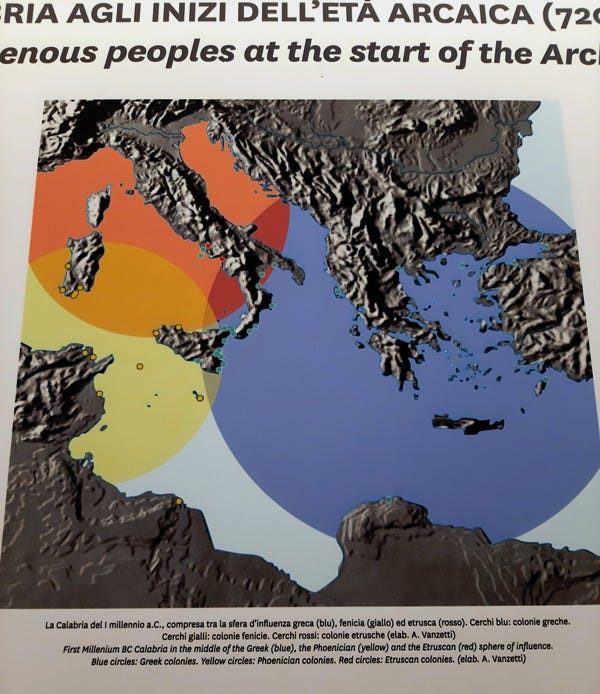
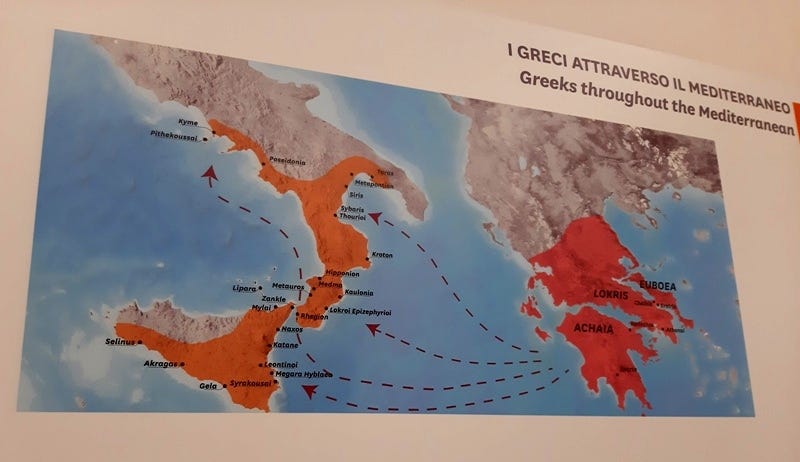

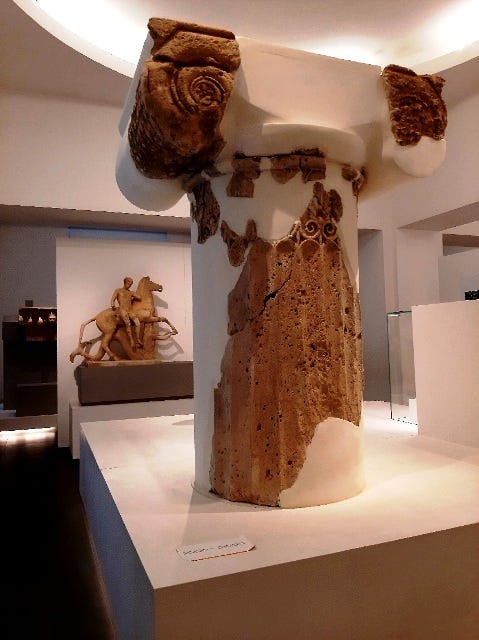
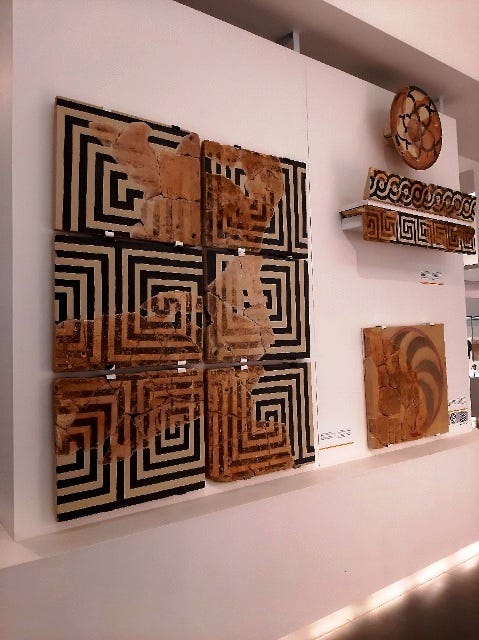

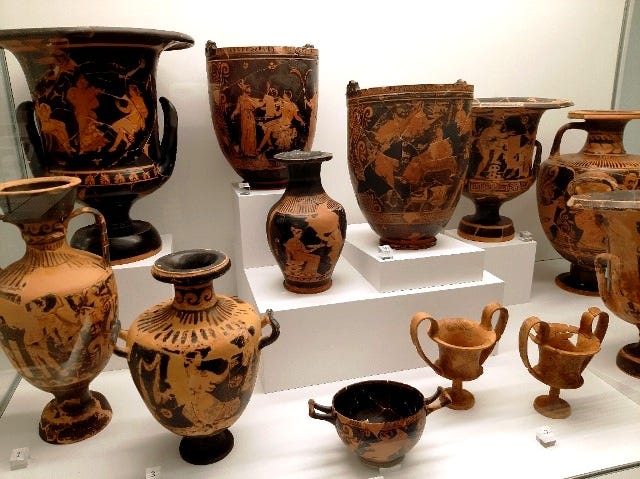
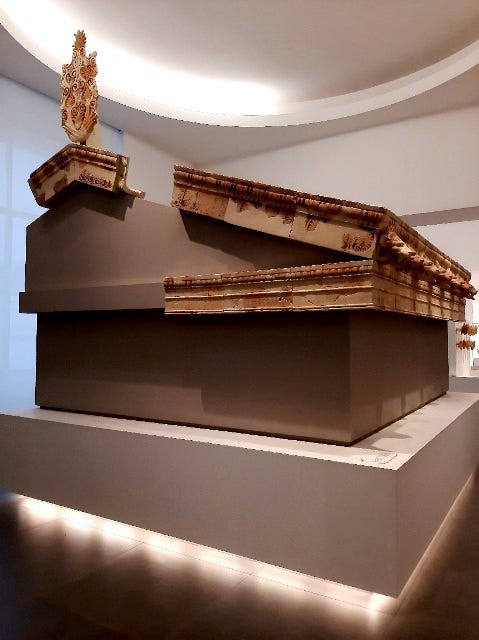


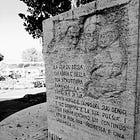
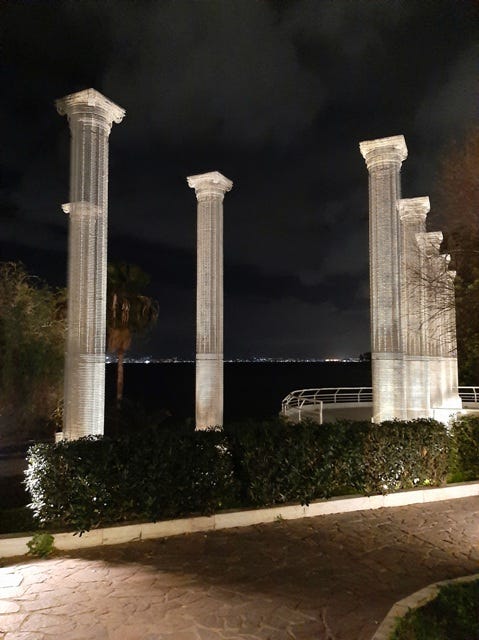
Bellissimo reportage! Chissà come me lo ero perso nei meandri delle email. Comunque piacerebbe anche a me avere l’obbligo di andare a teatro ahahhaa
Certo che la nostra penisola è sempre stato un luogo pazzesco.
Molto interressante!!